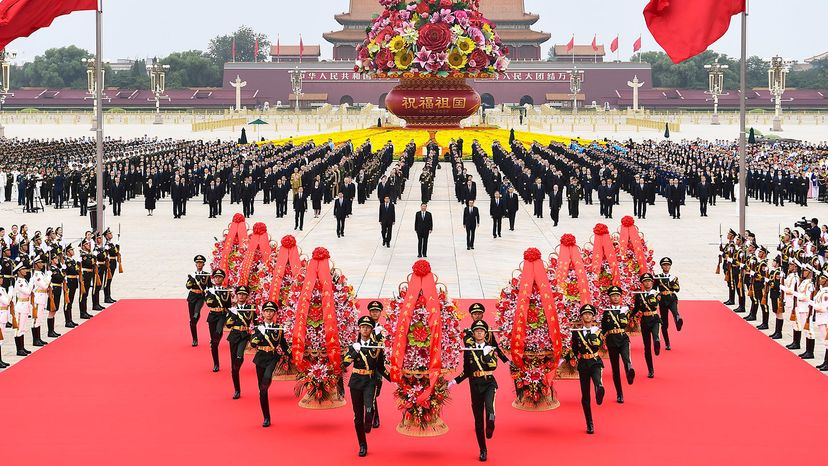The Spread of Communism

Communism wasn't contained inside the Soviet Union. As Marx's tenets had instructed, it had to spread worldwide to achieve utopia. Some countries had adopted communism to help realize that goal, including:
- Warsaw Pact Nations: Albania, Bulgaria, Czechoslovakia, Romania, Poland and Hungary (communist from about 1945 to 1991). The Warsaw Pact was a military treaty signed by these countries and Russia. In short, it guaranteed that they would come to each other's aid if targeted by another country.
- Yugoslavia (1945-1992)
- North Vietnam (1954-1976, although still technically communist following the unification of Vietnam)
- Yemen (1969-1990)
- Somalia (1969-1991)
- Cambodia (1975-1989)
It's interesting to note that the communist governments in all of these countries (except North Vietnam) collapsed right around the same time as the Soviet Union, which was a huge support to the smaller countries [source: Somin].
Advertisement
If Stalin had his way, communism would have become much more widespread, especially in the West. In the 1930s, he enacted a plan to overtake this region with furious industrial development. His hope was that Russia would become such a military powerhouse that it would stand up to the other powerful nations, especially the United States. His efforts fell short, and as we've learned, the Soviet Union slowly fell apart due to these economic disadvantages.
However, communism does have a presence in the United States today. The Communist Party USA is a left-wing group with about 5,000 members nationwide. The group advocates the end of the working class's exploitation and oppression. Ultimately, the party hopes to implement a socialist society where all people will benefit from the wealth present in the United States. The party experienced something of a boost in the USA after Donald Trump was elected president in 2016, likely because of the rise of democratic socialism peddled by candidates like Bernie Sanders [source: Gomez].
Communism also rose to power in the following nations, where it is still alive today:
- China, since 1949
- Cuba, since 1959
- Vietnam, since 1976
- North Korea, since 1948
- Laos, since 1975
Although the governments of these countries continue to embrace communism, the results have been largely underwhelming. Cuba has suffered multiple economic crises and its people regularly deal with food and supply shortages. North Koreans are subject to food rationing and are often malnourished. They are also cut off from the rest of the world due to the country's severe isolationist policies. However, Vietnam and China are both hubs of manufacturing, and Vietnam's people, in particular, have seen rapid quality of life improvements in the last two decades [source: Casiano].
Home to more than 20 percent of the world's population (1.3 billion people), China is one of the world's most prominent communist governments. Mao Zedong, China's dictator, launched and raised the communist government in China, employing many of Stalin's tactics.
In addition to the death camps Mao instituted to combat Chinese counter-revolutionaries, he also developed a plan called the Great Leap Forward, which forced collectivization of agriculture. Peasants were ushered into communes when Mao seized their property. They were forced into slave labor, and personal ties they had to their families and former lives were severed. Mao also forced mass industrialization, which, coupled with the extremes of forced agricultural collectivization, killed somewhere around 16.5 million to 40 million Chinese from 1957 to 1961. He also ordered the executions of Communist Party members during his tenure [source: University of Chicago Chronicle].
Today, China's government encourages capitalist ventures, which has resulted in a greatly improved economy. China boasts a huge manufacturing industry, churning out toys, furniture, electronics and other products. Despite these gains, the government remains extremely dictatorial in nature, exerting authority over censorship and other basic civil liberties. Human rights activists are regularly harassed, prisoners are detained without a trial and censorship abounds [source: Amnesty International].
As of 2022, no other countries have taken the path toward communism since the 1970s.